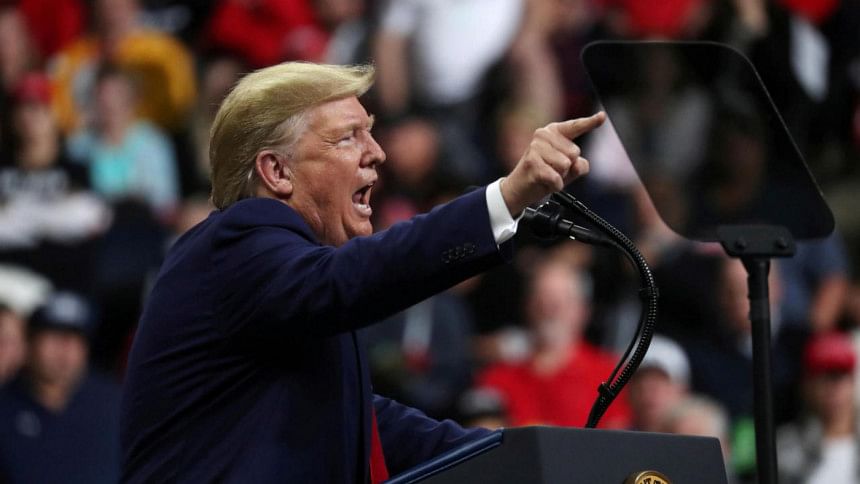The ‘seditious heart’

I often wonder about the psyche and motivation of people who choose to resist unfairness, inequity and tyranny at a great personal cost. And I don't mean luminaries like Mahatma Gandhi, Nelson Mandela, and Martin Luther King Jr., but the unsung heroes who feel it their bounden duty to act in the public interest and ensure that future generations benefit from their selfless acts of moral valour.
The question seems to have gained a new relevance in the context of the high political drama being enacted as part of US President Trump's impeachment inquiry by the Congress. As most of us know, the case against the president mainly rests on a complaint filed by a "whistleblower" who reported that, in a telephone call, Donald Trump solicited help from the Ukrainian president to investigate Joe Biden, his leading Democratic rival for next year's presidential elections. To compound the illegality of his request, Trump asked for the "favour" as a quid pro quo for releasing military aid to Ukraine.
The US president's request comes as no surprise. Ever since assuming office, he has brazenly misused his executive authority to intimidate his opponents, shield his cronies, and abuse his privileges, often blurring the distinction between his business and his presidential role. He managed to do all this with impunity and a hubris hitherto unknown in the annals of the American presidential history. In the face of the bullying, intimidation and bluster, it only took one brave person with a strong moral conscience to report a presidential misdemeanour that prompted the Congress to start an impeachment enquiry.
It might be useful to take a short detour here and elaborate on the culture of whistleblowers in the context of the United States. Whistleblowers are individuals who disclose institutional or governmental "illegality, waste, and corruption", with the purpose of apprising the public as well as appropriate authorities of actions that may result in adverse consequences for the country or the institution in question. However, to maintain the neutrality of the process, whistleblowers are protected by law from repercussions such as removal from office, threats or physical harm. Needless to say, the system is designed as a check and balance for the abuse of power by men and women in positions of authority. Although the protection is not always airtight, individuals continue to display exceptional courage to come forward and expose wrongdoing.
The impeachment inquiry against President Trump has generated multiple debates and discussions leading to speculations about what the final outcome might be, especially in the context of a Republican-majority Senate. While the investigations are moving at a fast pace, I am equally interested in what motivates whistleblowers to come forward, risking collateral damage to their life and career. Why are they prepared to confront the legal, ethical, financial and personal challenges that they face in their arduous journey to reveal the truth? Is the motivation purely altruistic? History tells us that in most cases, the answer is "yes". The majority of whistleblowers are men and women who put up a heroic resistance when institutions are under assault, democracy is under threat and the disempowered are subjected to political injustices.
I believe that there are primarily three ways in which people react if and when they witness or confront a wrongdoing. Some choose to remain silent, unless the problem hits them directly. The majority prefers to discuss and debate the issue within the comfort of their living rooms. Only a few make the daunting decision to "act" either individually or in collaboration with fellow citizens.
Making a choice of whether or not to act when faced with oppression and injustice is not alien to many Bangladeshi citizens. The Bangladesh Liberation Movement is a living testimony of people's protests against tyranny. Having lived through that experience, I too have learned the importance of making my voice heard when faced with social or political injustices—no matter how feeble the voice may be. Thus, while watching the democratic institutions and people's rights being attacked by the Trump administration, I opted to join a group of like-minded activists involved in educating voters about issues as well as convincing them that only their votes can bring about change. Admittedly, what we do in our group may be a drop in the vast ocean, but it still is a drop. What I discovered in the process is that there are numerous small groups like ours that are adding to the ocean.
Many people ask why I canvass in the Washington summer heat or spend hours making phone calls and writing postcards to voters, when the election results will not make a big difference in my personal day-to-day life. How can I explain to them that the sheer thought of people "accidentally" killed by policemen because of their race or colour, children separated from undocumented parents and put in cages, and citizens waiting to die because they cannot afford the cost of health care, torments me and I cannot remain a silent spectator? The fieldwork has not only channelled my frustrations in a positive direction, but it has also enhanced my understanding of why whistleblowers risk everything to help their community or country. I am convinced that they are compelled by an inner calling motivated by intense distress at watching the democratic system disintegrate, or just a compassionate desire to relieve another's pain. It cannot be articulated in plain words—you either feel it or you don't. Author-activist Arundhati Roy captured the idea in a single, evocative phrase: it's the "seditious heart" that rebels against injustice, inequity and discrimination!
Milia Ali is a Rabindra Sangeet exponent and a former employee of the World Bank.

 For all latest news, follow The Daily Star's Google News channel.
For all latest news, follow The Daily Star's Google News channel. 



Comments